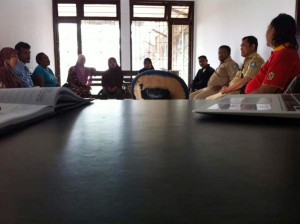 Even though the Indonesian Government has ratified the Convention on the Rights of Persons with Disabilities Law since 2011, until now, the implementation of this regulation is still far from what we have expected all this time. As in Sorong District, West Papua, there are still many rights of the disabilities the government has not yet fulfilled. Furthermore, many difables in Sorong are still excluded from their social environment as the society excommunicates them.
Even though the Indonesian Government has ratified the Convention on the Rights of Persons with Disabilities Law since 2011, until now, the implementation of this regulation is still far from what we have expected all this time. As in Sorong District, West Papua, there are still many rights of the disabilities the government has not yet fulfilled. Furthermore, many difables in Sorong are still excluded from their social environment as the society excommunicates them.
As an effort to encourage Sorong Government and its people to be more responsive to the needs of the people with disabilities, Central of Regional Information and Studies (PATTIRO) had an initiative to held a multi stakeholders forum which specifically discusses the issue regarding persons with disabilities mainstreaming in Sorong, West Papua, Wednesday, 23 September 2015. This forum is attended by the representatives of the government such as Sorong Social Department, Health Department, and Department of Labour. In addition, several delegations of Community Health Center in Sorong were present at the forum. Beside the representatives of Sorong Government and the Community Health Center, the difables and their families were also engaged in this discussion.
PATTIRO finds that the roles of the government, service providers, and communities to realize social inclusion of persons with disabilities have not worked well. “On one hand, many people in Sorong still think that disability is a disgrace. Many of them also consider it as a curse. Thus, many people with disabilities are hidden and not allowed to have any activity outside their home by their family”, said PATTIRO Public Service Specialist Rokhmad Munawir on Wednesday, 23 September 2015.
On the other hand, Rokhmad added, the role of Sorong Government in enforcing the implementation of the existing regulations regarding the rights fulfillment of the difables has not maximally carried out, just like the implementation of the Law Number 4 Year 1997 on Person with Disability which mandated both state and private company to provide at least one percent position to be filled by the difables. “Many companies in Sorong District have not obeyed this regulation. And what makes it worse is Sorong Labour Department is unable to “force” them to comply with the Law”, Rokhmad explained.
Furthermore, the service provision particularly regarding the accommodative health services for the disabilities is still considered not helpful enough. “Though Sorong Health Department and the Community Health Centers in Sorong has shown a great commitment to provide accommodative health services for the difables, in practice, there are still many of them who do not get the best health care services. This is partly because the government has not specifically provided any operational vehicle which can be used to pick up the difables who are not able to the health center due to many reasons,” Rokhmad asserted.
Rokhmad explained, the reason why Sorong Health Department has not able to provide such facilities because the lack of budget. “When we ask them about the special autonomy fund given by the Central government, they admit that they do not know for sure what the money was spent on. This is a pity considering we can use this budget to support the availability of difables-friendly health care facilities” he said.
As one of civil society organizations which focus on difables issue, PATTIRO finds it important for the Government of Sorong District to take action as soon as possible. They can start it from creating programs for the difables so they do not have to wait for the instruction from the Central Government. Moreover, in order to change their negative perception, PATTIRO are committed to keep providing the society with wider knowledge and deeper understanding related to disabilities. “By creating accommodative programs, changing people’s perceptions and attitudes, and providing capacity buildings for the difables, we can definitely make social inclusion of persons with disabilities come true”, Rokhmad emphasized.




